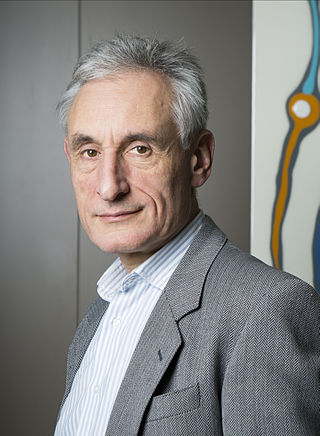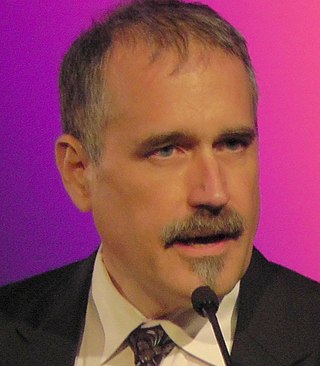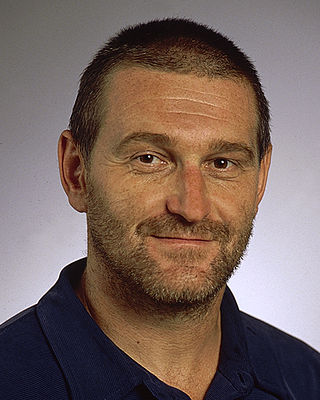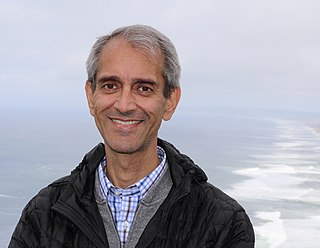Related Research Articles
Gabor Tamas Herman is a Hungarian-American professor of computer science. He is Emiritas Professor of Computer Science at The Graduate Center, City University of New York (CUNY) where he was Distinguished Professor until 2017. He is known for his work on computerized tomography. He is a fellow of the Institute of Electrical and Electronics Engineers (IEEE).
Terrence Joseph Sejnowski is the Francis Crick Professor at the Salk Institute for Biological Studies where he directs the Computational Neurobiology Laboratory and is the director of the Crick-Jacobs center for theoretical and computational biology. He has performed pioneering research in neural networks and computational neuroscience.
Thomas Kailath is an Indian born American electrical engineer, information theorist, control engineer, entrepreneur and the Hitachi America Professor of Engineering emeritus at Stanford University. Professor Kailath has authored several books, including the well-known book Linear Systems, which ranks as one of the most referenced books in the field of linear systems.

Eduardo Daniel Sontag is an Argentine-American mathematician, and distinguished university professor at Northeastern University, who works in the fields control theory, dynamical systems, systems molecular biology, cancer and immunology, theoretical computer science, neural networks, and computational biology.

Andrew Blake FREng, FRS, is a British scientist, former laboratory director of Microsoft Research Cambridge and Microsoft Distinguished Scientist, former director of the Alan Turing Institute, Chair of the Samsung AI Centre in Cambridge, honorary professor at the University of Cambridge, Fellow of Clare Hall, Cambridge, and a leading researcher in computer vision.

Alan Conrad Bovik is an American engineer, vision scientist, and educator. He is a professor at the University of Texas at Austin (UT-Austin), where he holds the Cockrell Family Regents Endowed Chair in the Cockrell School of Engineering and is Director of the Laboratory for Image and Video Engineering (LIVE). He is a faculty member in the UT-Austin Department of Electrical and Computer Engineering, the Machine Learning Laboratory, the Institute for Neuroscience, and the Wireless Networking and Communications Group.

Jitendra Malik is an Indian-American academic who is the Arthur J. Chick Professor of Electrical Engineering and Computer Sciences at the University of California, Berkeley. He is known for his research in computer vision.
Leslie Frederick Greengard is an American mathematician, physicist and computer scientist. He is co-inventor with Vladimir Rokhlin Jr. of the fast multipole method (FMM) in 1987, recognized as one of the top-ten algorithms of the 20th century.

Pavel Arkadevich Pevzner is the Ronald R. Taylor Professor of Computer Science and director of the NIH Center for Computational Mass Spectrometry at University of California, San Diego. He serves on the editorial board of PLoS Computational Biology and he is a member of the Genome Institute of Singapore scientific advisory board.
Erdal Arıkan is a Turkish professor in Electrical and Electronics Engineering Department at Bilkent University, Ankara, Turkey. He is known for his implementation of polar coding.
Chung-Chieh Jay Kuo is a Taiwanese electrical engineer and the director of the Multimedia Communications Lab as well as distinguished professor of electrical engineering and computer science at the University of Southern California. He is a specialist in multimedia signal processing, video coding, video quality assessment, machine learning and wireless communication.

Demetri Terzopoulos is a Greek-Canadian-American computer scientist and entrepreneur. He is currently a Distinguished Professor and Chancellor's Professor of Computer Science in the Henry Samueli School of Engineering and Applied Science at the University of California, Los Angeles, where he directs the UCLA Computer Graphics & Vision Laboratory.
Bernardo L. Sabatini is an American neuroscientist who is the Alice and Rodman W. Moorhead III Professor of Neurobiology at Harvard Medical School.
Karel Svoboda is a neuroscientist. His research focuses on the question of how the neural circuits of the brain produce behavior. He has also performed notable work in molecular biophysics, neurotechnology, and neuroplasticity, particularly changes in the brain due to experience and learning. In 2021, he became the Vice President and Executive Director of the Allen Institute for Neural Dynamics.
Stefano Lonardi is an Italian computer scientist and bioinformatician, currently Professor and Vice Chair of the Department of Computer Science and Engineering at University of California, Riverside. He is also a faculty member of the Graduate Program in Genetics, Genomics and Bioinformatics, the Center for Plant Cell Biology, the Institute for Integrative Genome Biology, and the Graduate Program in Cell, Molecular and Developmental Biology.
Anant Madabhushi is the Donnell Institute Professor of Biomedical Engineering at Case Western Reserve University (CWRU) in Cleveland, Ohio, USA and founding director of CWRU's Center for Computational Imaging and Personalized Diagnostics (CCIPD). He is also a Research Scientist at the Louis Stokes Cleveland Veterans Administration (VA) Medical Center in Cleveland, OH, USA. He holds secondary appointments in the Case Western Reserve University departments of Urology, Radiology, Pathology, Radiation Oncology, General Medical Sciences, Computer & Data Sciences, and Electrical, Computer and Systems Engineering.
Francis "Frank" J. Doyle III is an American engineer and academic administrator. He is a professor of Engineering and provost of Brown University.

Krishna Vaughn Shenoy (1968–2023) was an American neuroscientist and neuroengineer at Stanford University. Shenoy was the Hong Seh and Vivian W. M. Lim Professor in the Stanford University School of Engineering. He focused on neuroscience topics, including neurotechnology such as brain-computer interfaces. On 21 January 2023, he died after a long battle with pancreatic cancer. According to Google Scholar, he amassed an h-index of 79.

Yonina C. Eldar is an Israeli professor of electrical engineering at the Weizmann Institute of Science, known for her pioneering work on sub-Nyquist sampling.
Achille Messac is the Dean of the College of Engineering, Architecture and Computer Sciences at Howard University. He has previously served as Professor of Aerospace Engineering Mississippi State University. He was elected a Fellow of the American Association for the Advancement of Science in 2019.
References
- 1 2 "Eero P. Simoncelli, PhD". Howard Hughes Medical Institute. Retrieved 8 May 2017.
- ↑ "Eero P. Simoncelli". Simons Foundation. 22 October 2015. Retrieved 5 June 2017.
- ↑ "IEEE Fellows". Information Theory Society. IEEE. Archived from the original on 20 January 2010. Retrieved 5 June 2017.
- ↑ "Honorees Announced for the 67th Engineering Emmy Awards". Television Academy. 29 September 2015. Retrieved 5 June 2017.